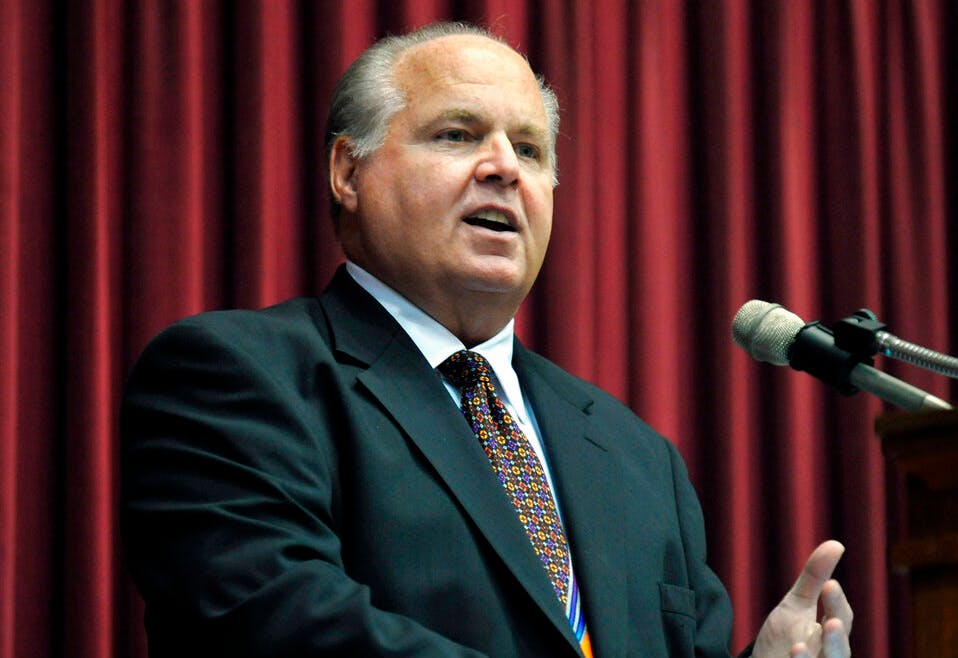How Rush Limbaugh Found Common Ground With Listeners on the Left
Three years after the death of radio’s greatest of all time, Americans of all stripes are tuning in on the hope that they might hear him again.

Rush Limbaugh listeners are mourning the third anniversary of his passing while sending a message to those seeking to fill his shoes: His formula of “combining irreverent humor with the serious discussion of issues” saved the AM band, and it’s hungry for hosts who carry on in that spirit.
On Valentine’s Day, I guest hosted “The Derek Hunter Show” on WFMD-AM in Frederick, Maryland. Since the man I called “Rush” during my 25 years working for the EIB Network so loved the audience and America, I invited his wife, Kathryn Adams Limbaugh, to our former affiliate.
The interview fell a few days before February 17, the date in 2021 that — after the iconic riff of the Pretenders “My City Was Gone” — Mrs. Limbaugh addressed the audience to say that Rush had returned his “talent on loan from God.”
My goal in interviewing Mrs. Limbaugh wasn’t ratings or exposure, but the conversation resulted in both. On “The Official Facebook Page of America’s Real Anchorman” alone, audio of our conversation racked up over one million views in two days.
“I really sincerely feel,” Mrs. Limbaugh said, that the grief over Rush’s passing “is not just mine, it’s ours.” She welcomes hearing from “people who are still thinking of him and still wishing he were here.”
Mrs. Limbaugh co-authored a book with Rush’s brother, David Limbaugh, “Radio’s Greatest of All Time.” The title echoes the phrase “greatest radio host of all time,” listed under “occupation” on Rush’s death certificate — one last joke meant to amuse fans and tweak foes.
“Everyone who knew Rush or listened to Rush,” Mrs. Limbaugh said, “knew that he was one of them, one of the most giving, generous people you could ever meet. He cared so deeply about everyone around him, whether he knew them or didn’t personally know them.”
It’s a little-covered side of Rush. As a result, many would-be heirs have absorbed an inaccurate view of how he achieved success. They resort to the name-calling and anger that were anathema to him because it’s the caricature created by detractors.
I asked Mrs. Limbaugh what she thought of the focus on President Biden’s “bad memory,” described by the special counsel, Robert Hur. “I truly think he would have enough material based on the failed policies under Biden’s administration and the country going off the cliff that I don’t think he would focus too heavily on Biden’s age.”
We discussed Rush finding common ground with people on the left. These included the musician Sir Elton John; the Pretenders’ lead singer, Chrissie Hynde; the actor-dancer, Gregory Hines, and the feminist icon, Camille Paglia.
Embracing these relationships was part of who Rush was. “Rush was for equality of people,” Mrs. Limbaugh said. “He believed in liberty — and certainly any smart person, he respected them and loved to talk to them.” It’s why he put callers who disagreed at the front of the line.
I remarked upon Rush’s diverse staff and how there was never any “political litmus test.” If you shared his “relentless pursuit of excellence,” you got your shot. “If you didn’t agree,” I said, “Rush would just take it as a challenge. He believed in his persuasive ability.” It’s another facet imitators miss.
Philanthropy, public and private, is another overlooked part of Rush’s legacy, one carried on by the Rush and Kathryn Adams Limbaugh Family Foundation. All proceeds from the sale of “Radio’s Greatest of All Time” are donated to the families of fallen military members.
As with those of us in what Rush ribbed as his “highly overrated staff,” there is no political screening for charity. On his 2005 USO visit to Afghanistan, Rush encountered one soldier who asked if Rush wanted to meet him, a Democrat. Rush responded that he was there to honor all who served.
It was inevitable that someone who spoke 15 hours a week for more than 30 years would stumble, but Rush was never too big to apologize. He wasn’t perfect. He was, however, radio’s greatest — so good at what he did that millions keep tuning in hoping to hear him years after he signed off in the spirit of the showman’s mantra: “Always leave them wanting more.”

